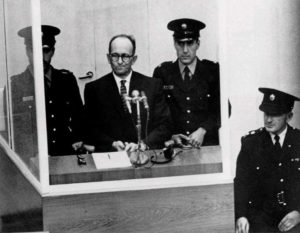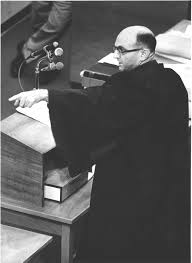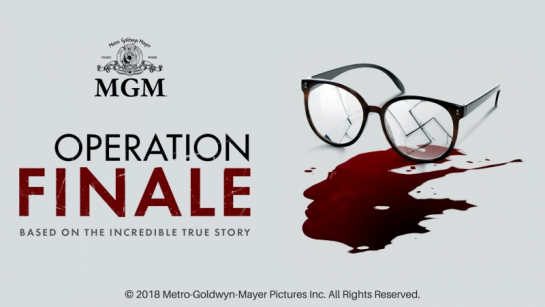When the accused, a slight, bespectacled, and twitchy 55-year-old, stepped into the bullet-proof glass booth at the Jerusalem District Court in April 1961, the public reacted in stunned horror. “He looked like a clerk,” recalled my grandmother, Mirjana Gross, who spliced daily newsreels of the trial at the time for distribution by what later became the United Studios of Israel. Emory University scholar Deborah Lipstadt noted in an interview with NPR that, “when he walked into that glass booth, which was built to protect him from harm from the people in the gallery, people were amazed because he looked much more like a bureaucrat, like a pencil pusher…. Could this be the man who had been responsible for the destruction of millions? There seemed to be a disconnect.”

As the chief of the Gestapo’s Department of Jewish Affairs during the Second World War, Adolf Eichmann was anything but a clerk. Rather than serving as a mere cog in the Nazi machinery – as he unsuccessfully tried to make his judges believe – he was in fact an architect of the Final Solution that systematically murdered six million Jews in Europe.
How Eichmann arrived in the country that would ultimately condemn him to death is the subject of “Operation Finale,” the newly released thriller directed by Chris Weitz. It chronicles “the 1960 covert mission of legendary Mossad agent Peter Malkin as he infiltrates Argentina and captures Eichmann, the Nazi officer who masterminded the transportation logistics that brought millions of innocent Jews to their deaths in concentration camps.” Led by Oscar Isaac (“Inside Llewyn Davis,” “Ex Machina,” “Star Wars: The Force Awakens,” and Hamlet) as Malkin, Ben Kingsley (“Gandhi,” “Betrayal,” and “Dave”) as Eichmann, and a multinational cast that features Ohad Knoller (“Yossi & Jagger”), Lior Raz (“Fauda”), and Melanie Laurent (“Inglourious Basterds”), the story focuses on conversations between Eichmann and his “Herr Captor,” Malkin.
The two find themselves holed up within the confines of an Argentinian safe house while arrangements for a clandestine trip back to Israel are in process. Malkin, an intelligence operator (and a budding painter occasionally seen sketching portraits of both his prisoner and murdered sister) with that quintessential Israeli tendency to question orders – and authority, while he’s at it – is trying to persuade Eichmann to cooperate in his extraction out of Argentina. Eichmann, in turn, tries to persuade Malkin that they are more alike than may be assumed: each follows orders in service to his country’s defense. That line of defense proves tenuous.
Kingsley portrays his role with a mystifying precision. He sneers perpetually at everyone he encounters. He boldly and intentionally oscillates his arms like “a human metronome” as he marches each day to and from the bus that takes him to his day job in Argentina. Kingsley is not new to this genre of film, having starred in “Schindler’s List” and “Murderers Among Us: The Simon Wiesenthal Story,” among others. He has examined over many years the multiple strands of a narrative that continues to be woven.
The banality of some of the dialogue, along with scenes showing Eichmann being observed on the toilet, being shaved, and being fed lend to the idea that he is a powerless man without agency who simply had things happen to him and compliance demanded of him. The film, hinting at a fundamental tension that never fully develops, eventually finds its way out of this neat but false logic towards a profound ending that delivers us to day one of his trial in Israel.

Attorney-General Gideon Hausner famously opens by stating that, “When I stand before you here, Judges of Israel, to lead the Prosecution of Adolf Eichmann, I am not standing alone. With me are six million accusers. But they cannot rise to their feet and point an accusing finger towards him who sits in the glass booth and cry: ‘I accuse.’ For their ashes are piled up on the hills of Auschwitz and the fields of Treblinka, and are strewn in the forests of Poland. Their graves are scattered throughout the length and breadth of Europe. Their blood cries out, but their voice is not heard. Therefore I will be their spokesman and in their name I will unfold the awesome indictment.”
Over 100 Holocaust survivors provided witness testimony for Criminal Case No. 40/61 that recorded in detail the evils of Eichmann and the Third Reich. It was a landmark chapter in the collective consciousness of the world’s remaining Jews. “Until the Eichmann trial no one really spoke about the horrors of the Holocaust. Many survivors kept silent, even to their children,” explained Avinoam Armani, the director of the Museum of the Jewish People in Tel Aviv, which curated an exhibition similarly titled “Operation Finale” in 2012.
Now, as the Holocaust generation passes, the question emerges of who will continue to recount the events of the past. “Operation Finale” offers one part of the narrative, but is it nuanced enough? U.S. Holocaust Memorial Museum historian Edna Friedberg warns that, “[p]eople often reduce the Holocaust to a morality tale, where the evildoers are only evil, and the victims are somehow only martyrs pure of soul…. Survivors have the credibility to look at some of the uncomfortable crevices in stories and not to make everything so simple.” The responsibility of seeking out nuance and complexity seems, then, to fall to the rest of us.
Movie times: click here
Director: Chris Weitz
Actors: Oscar Isaac, Ben Kingsley, Lior Raz, Ohad Knoller, Melanie Laurent
Running Time: 2 hours 3 minutes
Rated: PG-13 for disturbing thematic content and related violent images, and for some language





